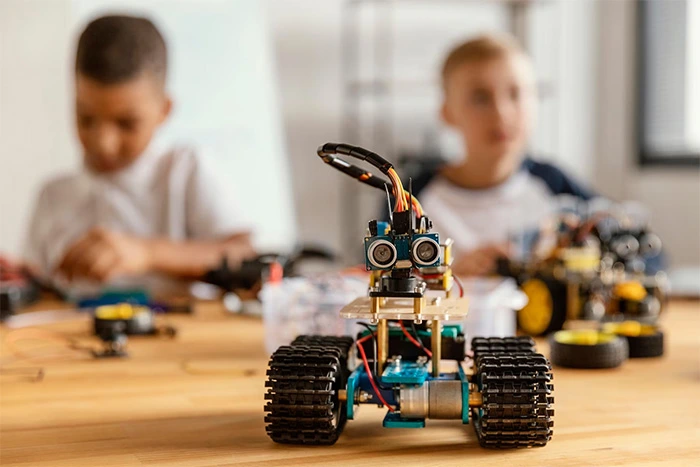The use of gadgets by children can bring multiple benefits if it is managed properly
Today’s children will grow up and live in a world where technology plays a central role. Understanding and adapting to these technologies will be important to their success in the future society.
We mention from the beginning that proper management of the use of gadgets is essential to avoid possible negative effects. It is recommended to set time limits for the use of gadgets, monitor the content accessed by children and promote a balanced use of technology combined with other recreational and social activities in children’s lives. At the same time, we recommend that technological education be done in parallel with education about humanity.
Children today have access to a wide range of technologies such as smartphones, tablets, computers and smart devices that allow them to communicate, learn and interact with the world in a different way than previous generations. These technologies can facilitate children’s learning, cognitive development and creativity.
In the future, emerging technologies such as artificial intelligence, virtual and augmented reality, the Internet of Things and robots are expected to play an even greater role in children’s lives. These technologies have the potential to change the way children learn, play and interact with their environment.
However, it is important to ensure that children understand how to use technology responsibly and are aware of the associated risks. Educating them about online security, data privacy, and developing healthy technology habits is critical to helping them navigate an ever-evolving digital world.

For children to adapt and understand technology, it is beneficial to grow up in an environment where it is present and used frequently. It is important to provide opportunities for children to interact with technology in an educational and supervised way.
Through early exposure to technology and learning how to use it correctly, children can develop essential digital skills such as surfing the internet, using apps and digital platforms, solving technical problems and thinking critically online.
It is advisable to strike a balance between screen time and other activities important to children’s development, such as outdoor activities, group games and offline social interaction. It is the responsibility of adults to set limits and provide guidance to children regarding the appropriate and healthy use of technology.
It is also important to promote digital literacy and provide educational resources and programs that teach children to use technology in a creative, productive and responsible way. This can include learning coding, programming, digital design and online research skills.
By growing up with technology, children can develop the skills needed to adapt to rapid changes in society and the world of work. However, it is important that this exposure is balanced and accompanied by learning values and ethics in the use of technology to help children become responsible and aware users of it.
The use of gadgets and technology in general can bring multiple benefits to children if managed properly. Here are some of the potential benefits:
Access to information and education
Gadgets and Internet access provide children with excellent opportunities to access information and educational resources in a quick and convenient way. These can play an important role in their learning and development.
With the help of gadgets, children can access a variety of online educational platforms, applications and specialized websites that provide them with materials and interactive lessons in different fields. These resources can be adapted to children’s age level and interests, allowing them to learn in an engaging and personalized way.
The Internet also gives children the opportunity to explore new topics and satisfy their curiosity by searching for information. They can find answers to their questions, study various subjects and discover new worlds including cultures, animals, history and science. Thus, gadgets become a valuable source of knowledge and discovery.
In addition, there are also educational apps and games that intelligently integrate technology and interactive learning. They can help children develop cognitive skills, learn math, foreign language, problem solving skills and more through fun and engaging activities.
However, it is important to have proper supervision and guidance from adults regarding the use of gadgets and the Internet. Children need to be taught to evaluate and select information critically, be aware of online safety, and set limits on their use of technology to maintain a healthy balance in their lives.
Gadgets and the Internet can be valuable tools for children to access educational information and resources. They can provide them with learning and development opportunities in an interactive and engaging way, helping to expand their knowledge and stimulate their curiosity.
Development of cognitive skills
Digital apps and games can be intentionally designed to stimulate children’s logical thinking, problem solving, and cognitive skills development. These interactive activities can have multiple benefits for their intellectual and mental development.
Some digital games are designed to challenge children to think logically and solve complex problems. These may involve tasks such as solving puzzles, finding patterns or logically ordering items. By participating in such activities, children develop their reasoning and critical thinking skills, as well as the ability to find solutions and make decisions in a logical and efficient way.
In addition, some digital apps and games aim to boost the development of cognitive skills such as memory, attention and concentration. These may involve memory exercises, sequencing, matching and other tasks that help children improve their cognitive abilities and develop their concentration and attention skills.
Interactive digital activities can also promote the development of fine motor skills as well as hand-eye coordination skills. For example, games that require the use of a touch screen or controllers can help develop motor precision and dexterity.
It is important to note that while these apps and games may have cognitive benefits, balance and supervision are essential. It is advisable to alternate digital activities with other physical activities, outdoor games and social interactions. Parents and educators should also be aware of the appropriate age for using these apps and ensure that they are appropriate for the child’s development and maturity level.
Digital apps and games can be valuable tools for developing cognitive skills and problem solving in children. With appropriate selection and moderate use, they can be integrated into a wider educational program to support and stimulate children’s development in an engaging and interactive way.
Stimulating creativity
Gadgets can be great tools to stimulate children’s creativity. There are a variety of apps and digital platforms that can help children explore and express their creativity in a multitude of ways.
Through gadgets, children can access digital drawing and painting applications. These provide them with a wide palette of colors, drawing tools and special effects, allowing them to create unique digital artwork and experiment with various artistic styles and techniques. These apps can also provide interactive and easy-to-use features so that children can enjoy the creative process and develop their artistic skills.
Additionally, there are apps and platforms that allow kids to create animations. These help them understand the basic principles of animation and give them the opportunity to bring the characters and scenes they imagine to life. Through these tools, children can explore and experiment with movement, timing and storytelling through animation.
Music is another area where gadgets can play an important role in stimulating children’s creativity. There are apps and platforms that allow kids to compose, record and mix music in an interactive and engaging way. These digital tools can help them explore sounds, rhythms and harmonies and create their own melodies and musical pieces.
In addition to drawing, animation and music, gadgets also offer other possibilities for creative expression, such as creating videos, editing photos, writing and publishing stories or creating simple digital games.
Through these apps and platforms, children can develop their imagination, creative thinking, artistic skills and the ability to express their ideas and emotions in a new and engaging way. It is important that adults provide support and encouragement in children’s creative exploration, inspire them and provide them with opportunities to share their creations with others.
Gadgets can be great tools to stimulate children’s creativity, giving them opportunities for artistic expression and exploration in an interactive digital environment. These apps and platforms allow them to develop their creative skills and express their individuality in an engaging and personalized way.
Development of cognitive skills
It is true that certain games and apps on gadgets can be beneficial for developing children’s cognitive skills, such as logical thinking, problem solving, and math skills. These interactive digital activities can provide opportunities for children to practice and improve these skills in an engaging and fun way.
There are games and apps that are specially designed to develop children’s logical thinking. These may involve solving puzzles, filling in patterns, finding rules or solving logic challenges. Through these activities, children can develop their ability to think logically, make connections and solve problems in a structured and efficient way.
There are also apps and games that aim to stimulate the development of problem-solving skills. These may involve tasks that require planning, decision-making and finding solutions in a given context. By participating in such activities, children can develop their skills in identifying and solving problems, making informed decisions and finding effective strategies.
In addition, gadgets offer a wide range of math apps and games that can help develop children’s math skills. These may involve practicing basic math operations, solving math problems, exploring geometric concepts, or learning multiplication tables. Through these activities, children can strengthen their mathematical skills such as counting, calculating, recognizing shapes and developing mathematical concepts.
It is important to note that proper adult supervision and guidance is essential when using these games and apps. They can provide guidance and support to ensure that children understand the concepts and challenges and can relate these skills to real situations and contexts.
Certain games and apps on gadgets can be beneficial for developing children’s cognitive skills, such as logical thinking, problem solving, and math skills. Through these interactive digital activities, children can practice and improve these skills in a fun and stimulating way.
Communication and social interaction
Gadgets such as mobile phones, tablets and computers provide opportunities for communication and interaction with other children and family members through messaging platforms, video conferencing applications and social networks. These technologies have brought many benefits in terms of maintaining connections and developing communication skills.
Through messaging platforms, children can send text messages, images or audio recordings to friends or family members, regardless of distance. This makes communication easier and allows them to stay in touch even when they cannot meet in person. Also, video conferencing applications such as Zoom, Skype or FaceTime offer the possibility of making video calls in real time, allowing children to see and hear family members or friends while they are chatting with them. This brings an extra level of interaction and makes communication more personal.
Social networks, such as Facebook, Instagram or TikTok, also provide opportunities to communicate and interact with other children or family members. These platforms allow the sharing of images, videos, messages and posts, which can make it easy to connect and stay in touch in a fun and interactive way. However, it is important that safety measures are taken to protect the privacy and security of children when using these social networks.
The use of gadgets for the purpose of communication and interaction can also contribute to the development of children’s communication skills. They learn to formulate and deliver messages, answer questions and interact with other people online. However, it is important that parents and guardians provide proper guidance and supervision to ensure healthy and balanced use of gadgets so that children develop their communication skills in an appropriate and healthy way.
Gadgets provide valuable opportunities for communication and interaction for children and family members through messaging platforms, video conferencing applications and social networks. These technologies can facilitate maintaining connections and developing communication skills, provided they are used responsibly and with appropriate supervision.
Developing digital skills
Digital skills have become essential in the modern world. The use of gadgets can play an important role in introducing children to technology and developing digital skills, which can be of great help to them in the future.
The use of gadgets allows children to interact with different applications, software and online platforms, which gives them the opportunity to develop their digital skills. These skills can include surfing the Internet responsibly, searching for and evaluating information, using productivity and creativity apps, solving technical problems, and more.
As technology advances rapidly and digitization expands in various fields, digital skills are becoming increasingly sought after in the job market. Technology-related knowledge and skills are valued in many careers and can provide an advantage in obtaining employment and developing a successful career. Using gadgets from an early age can help children become familiar with technology and develop their digital skills, preparing them for the challenges and opportunities of the future.
However, it is important that the use of gadgets is balanced and supervised by parents or guardians. Children need to learn to use technology responsibly, follow online safety rules and have a clear understanding of the impact technology can have on them and on society in general.
Using gadgets can help children become tech-savvy and develop their digital skills, which can give them an edge in the modern world and in their future careers. However, it is important to pay attention to balance and provide adequate supervision to ensure healthy and responsible use of gadgets.
In conclusions
Digital parenting is no longer about how many minutes each week you leave your child in front of a monitor. It is no longer about what the child does in front of the monitor. Technology means more than a few social networks and a few online games.
Today’s digital parenting is about supporting children to adapt to a world based on gadgets, to a world where there will be AI. A world where the “parental example” is decisive. And by example we don’t mean the ease with which a clip is edited and uploaded to YouTube. We refer to the transmission of values that have nothing to do with technology and the online environment. Values that an AI will never be able to fully understand. Values that ‘in humanity
















